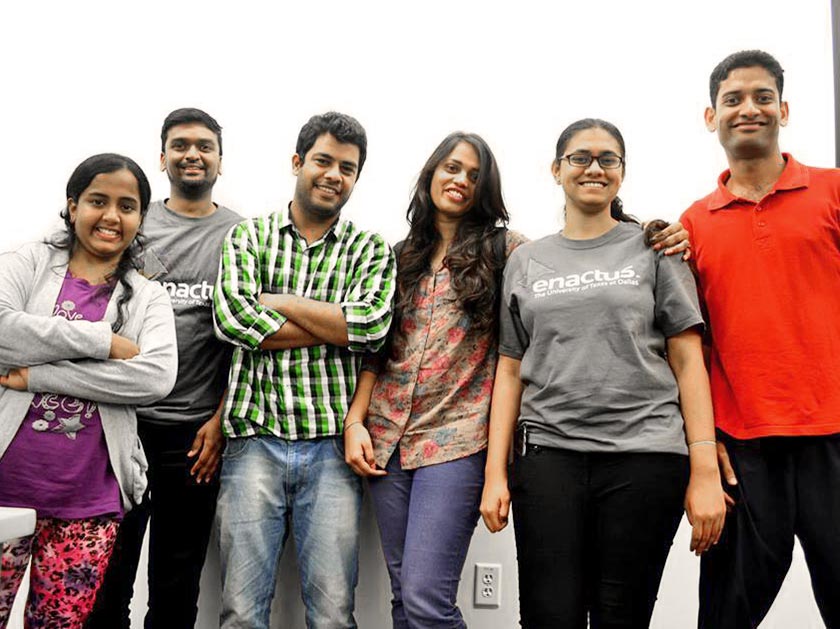
Members of Enactus at UT Dallas applied their business acumen to help Nandhini Indian Restaurant increase its customer base and improve profits.
About Enactus
Enactus is an international nonprofit organization that brings together student, academic and business leaders who are committed to using entrepreneurial action to improve the quality of life and standard of living for people in need.
Since fall 2006, the UT Dallas Enactus group has focused on giving back to the local community by educating individuals and doing various projects, such as financial literacy and success skills training.
A team of students from The University of Texas at Dallas was selected as a top 10 finalist in a yearlong national program that encourages the use of entrepreneurial skills and business savvy to improve a small business.
In March 2014, the Enactus team from the Naveen Jindal School of Management received a $1,250 grant from the Sam’s Club Step Up for Small Business Project Partnership. The students used the money on a one-year project to enhance the fundamental business skills of a small business and ensure its long-term sustainability.
First, the team conducted a needs assessment and created a custom business plan to strengthen operations at Nandhini Indian Restaurant in Plano. The plan called for improvements in areas such as website management and customization, ambiance, advertising, kitchen inventory management, menu enhancements and customer service.
The students used various marketing techniques, including customer surveys, market research, website and menu redesign, social media, search engine optimization, website promotions, online marketing, coupons and fliers.
All their hard work paid off. The restaurant’s owners welcomed the help and put the students’ business ideas to work. Within just a few months, the team helped the restaurant’s customer base increase 15 percent, and Nandhini’s profits rose 10 percent. Based on the project’s success, the team placed in the top 10 of the Step Up for Small Business Project Partnership, receiving $1,000. Nandhini received $2,000.
“The owners were just so impressed with what these students had done. It’s almost like they didn’t see them as students working on a project, but more as business consultants whom they completely trusted,” said Dr. Jeanne Sluder, senior lecturer and advisor to the group. “I really believe that part of the reason for our win is that the students crossed that boundary of being just students to really being experts in their fields.”
According to project lead Prashant Vajpayee, competition from nearby suburban restaurants that serve similar food has made it difficult for 3-year-old Nandhini to gain a foothold in the marketplace.
Vajpayee, a second-year MBA student, recognized that marketing, technology and business management would be critical to the project’s success. Thus, the team included one MBA student, two marketing students, two information technology and management students, and one computer science student.
“We utilized all our skills, including website marketing, social media promotions, competitor analysis and consumer analysis to promote this small business,” Vajpayee said. “We focused on the sustainable growth of the business by providing the owners and staff training in best business practices and involving the owners in our business meetings.”
With the $1,250 grant, the team developed various discount options, coupons, promotional offers and monthly specials, and promoted them on Facebook and Twitter. The students also conducted a survey of new menu items, which the students promoted by printing “to go” menus and distributing them throughout the community.
The team also helped Nandhini become an approved UT Dallas food vendor, which means the restaurant can cater university events.
This year, Jindal School Enactus students have completed 14 projects, according to Sluder. To promote seat-belt awareness, they organized a 5K run in March that attracted about 140 runners.
“We did our research and realized the age group that’s the guiltiest of not wearing seat belts is 13 to 24, so we have spent a year targeting this age group,” Sluder said.
Another recent project was raising funds for the medical staff at Texas Health Presbyterian Hospital in Dallas, where the nation's first Ebola diagnosis and death occurred in 2014. The students raised $500, which they presented at a thank-you luncheon at the hospital.
“The students set up a booth in the Student Union last semester, and let faculty, staff and students sign thank-you notes, thanking them for helping to ensure that the Ebola crisis didn’t turn out worse than it did and how much we appreciate what they did,” Sluder said.
“Our mission for the year has been to improve the livelihood of others, so every project we have done has been to do that,” she said.